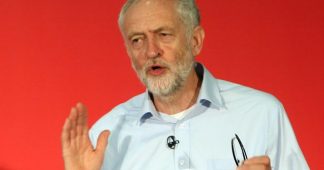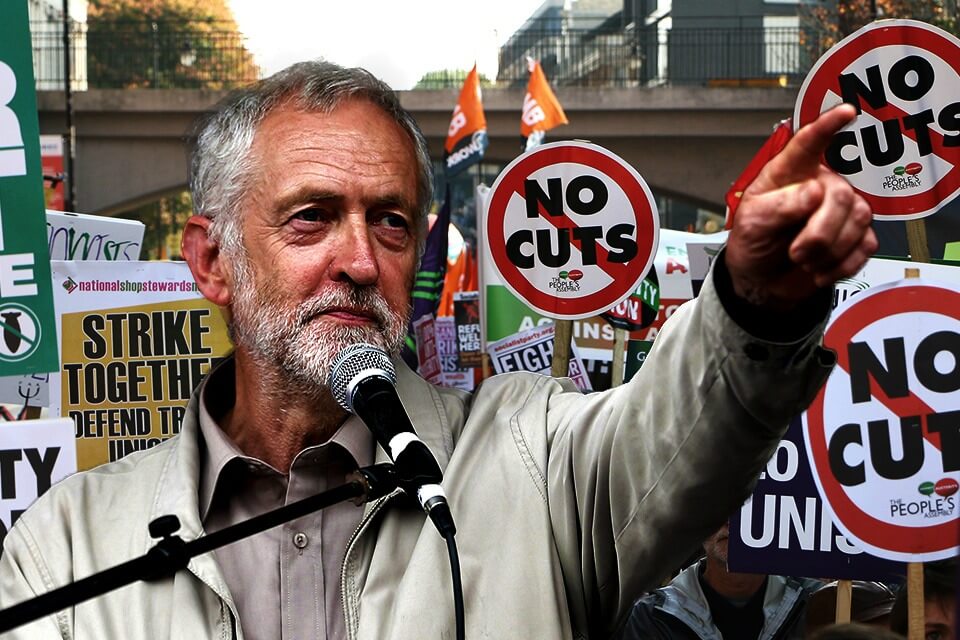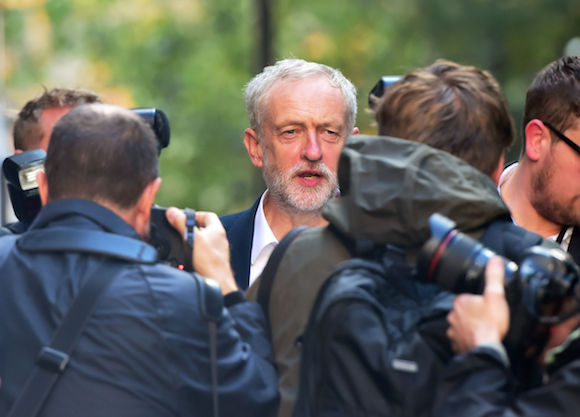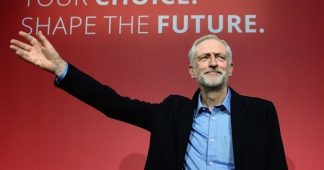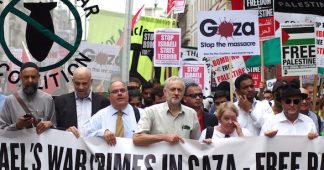In this second part of this very interesting article on Britain written by the British Marxists of Socialist Appeal, the polarized situation, which is developing in Britain, is being analyzed. The Tory government is facing a lot of problems. They have plans to cut more than £20bn in public spending, in order to achieve a budget surplus by 2019/20. This means that the crisis in Britain will deepen. But Tory’s have another big problem that should bother them. The eurosceptics on the far wright of the party have become a majority, while the pro – Europeans have become a minority. Cameron opened the Pandoras’ Box promising to conduct the EU – referendum. On the other hand the situation in the Labour Party is not better. After the unexpected victory of Corbyn a political revolution is being held in Britain. The working class of Britain in the face of Corbyn found somebody, which can lead the workers of Britain into power. History plays strange games… The bourgeoisie are in panic, thinking that the next Prime minister of Britain could be Corbyn. They can’t be sure if this government will last until the next elections in 2020. So a great war is being held against Corbyn, not only by the Mass Media but also by the members of the parliament of the Labour Party. Corbyn seems to be almost alone in the parliament, having to face both the Tories and his own Members. But Corbyn has the support of the masses and the will to change history!
Stathis Habibis
THE TORY GOVERNMENT
The Tory government came to power with only 24% support of the electorate. It has a very small majority and is prone to parliamentary upsets, as we saw in the case of the tax credits. This makes it a very weak government for the bourgeois, especially with the huge challenges ahead.
Despite the government’s propaganda, British capitalism is still in a parlous state. Growth in the past period has come not from investment or exports, but from consumer spending. This means the economy is resting on a very weak foundation. Consumer spending is not backed up by rising wages but from increased borrowing. Credit card spending has reached a ten-year high, as debt on credit cards rises to £62.7bn. Total UK debt has risen to £1.5tn, or 80.5% of GDP, compared to 69% of GDP in 2010/11, the first year of Osborne’s chancellorship.
Osborne has plans to cut £20bn in public spending over the parliament to achieve a budget surplus by 2019/20. Already his plans are off course, as October and November 2015 showed the worse public finances for six years.
This means even more cuts will be necessary. Now with increased spending on defence and security, more money will need to be found elsewhere. Osborne’s recent Winter Statement was a complete farce. The subservient Office of Budgetary Responsibility, a puppet of the Treasury, produced for him a “rabbit out of a hat”, when it miraculously forecast increasing growth and rising tax revenues, none of which will be realised in the coming world slump. The public finances will be devastated and they will be forced to extend austerity indefinitely.
This allowed Osborne to soft-peddle on cuts to tax credits, but the same people will be hit when Universal Credit is introduced. Despite all the fudges, the reality is that austerity is here to stay, as the Institute of Fiscal Studies explained.
Local government will face the brunt as local services are butchered and libraries, youth clubs, and social facilities are all closed down. According to IFS figures, local government, after these announced cuts, would see a reduction of 79% of its income! Transport cut by 70%.
The recent flooding has become particularly extreme and yet routine largely due to national and local government cuts – national flood prevention spending has been cut by 1/5 since 2010 and at the local level it is even more extreme. This has not gone unnoticed by workers; more crises like these will swamp the government each year.
Other areas face brutal cuts. As the deluge of cuts emerges, they will make this government the most unpopular government in history, undermining the Tories and shattering their electoral prospects. This will have decisive repercussions.
The crisis of British capitalism inevitably finds its expression most graphically within the Tory party. In the distant past the British ruling class used to plan their future in terms of continents and centuries, such was their confidence and power, but now they are unable to see further than tomorrow. They have become extremely empirical. Their political representatives have suffered the same degeneration, becoming short-term political opportunists rather than advancing the long-term interests of the bourgeoisie. The Conservative Party was considered the most successful bourgeois party in Europe, but they have caught the “European disease” and become prone to splits and squabbles. Their outlook was epitomised in the views of Margaret Thatcher, the shopkeeper’s daughter, to whom they all look with glowing admiration.
As the crisis deepens, long gone are the days of One Nation Toryism. The leadership is more reflective of the increasingly rightward moving Tory rank and file. They are English nationalists, reactionary elements, who look down on “the lesser breeds”. They detest Europe and dream of the return of the Empire, but that is long gone. They are irritated by immigrants and foreigners who have bought up much of British industry. They are worshipers of Margaret Thatcher, the epitome of reaction. But as a consequence of Thatcherism, the Conservative party lost its support in the north, especially in cities like Liverpool, Manchester and Sheffield. These are now, together with most of the north, no go areas for the Tories. In Liverpool, which in the past had returned a number of Tories, the party has only 100 members in a city of 466,000. In Scotland, they have been reduced to a sect. Over the years, they have become in the main a southern English party, primarily of the shires and Home Counties. Osborne’s attempts to remedy this with talk of a “northern powerhouse” are just that, talk. With no money to invest into the north, this weak attempt to pander to northern voters is sure to prove to be nothing more than hot air, and will fail to win the Tories any support.
Cameron attempted to reinvent the party, but the situation has forced him to retreat from this and pander to its rank and file. This led him to the dangerous position of “English votes for English laws”, which simply whipped up English nationalism and further antagonised the Scots and Welsh, potentially undermining the union further. The Financial Times, the mouthpiece of the more astute sections of the ruling class, came out firmly in opposition to this move, fearing the consequences.
Europe, once again, threatens to split the party. The creation of UKIP was a forewarning of this, a precursor of how things are likely to develop.
The issue of Europe has polarised the Tory party for more than 30 years. In fact, Tory splits over Europe contributed to bringing down the last two Conservative prime ministers – Thatcher and John Major. Cameron could easily meet the same fate. “The wounds run deep”, stated the Financial Times, recalling Major’s denunciation of his cabinet colleagues as “bastards”.
Cameron, who once urged his party to stop “banging on about Europe” in an attempt to introduce some sanity, is now faced with a seething revolt within its ranks. From a minority on the far right of the party, the eurosceptics have become a big majority, not only in the backward ignorant middle class ranks, but in the parliamentary party. The pro-Europeans, once dominant, have become a dwindling force, constantly on the retreat, and feeling increasingly isolated.
Cameron thought he could defuse the situation, especially with the rise of UKIP, by promising an “in-out” referendum on EU membership. He was prepared to gamble with Britain’s future for the sake of short-term political gain. But this has opened up a Pandora’s Box, raising all kinds of contradictions and dangers. The issue has now come back to haunt him, preparing the way for a bloody civil war within the party. “Now some senior Tories see it as a noose”, commented the Financial Times. While Cameron supports continued EU membership, he is being continually attacked and pressurised from the right. They will never be satisfied, whatever the result of the negotiations, unless Britain decides to leave Europe. Such opposition came close to undermining the last coalition.
In the last parliament, nearly 100 Tory MPs, a third of the party, signed a letter calling on Cameron to secure a national parliamentary veto over current and future EU laws. Even Hague, a Eurosceptic, was attacked as a “turncoat”, for not being eurosceptic enough. The Eurozone crisis has simply added to the fury of the eurosceptics, who regard the issue as a test of true loyalty. “The more time that goes on, the more sceptical the party gets about Europe,” stated David Davis, a senior Tory MP.
Rather than cooling things down, as Cameron thought, the referendum has served to heat things up further. Bankers attending last year’s Tory conference were startled by the pervasive mood of “rabid” Euroscepticism prevalent in the party.
Cameron has outlined the issues on which he wants change in Europe. Despite most of these being generally innocuous, European leaders have baulked on refusing state benefits at workers from other European states for 4 years. They see this as contrary to one of the fundamental principles of the Union: the free movement of labour. However, Cameron cannot concede on this. He has therefore threatened that if he does not get concessions he will campaign for Brexit. But he is playing with fire with these threats, which will come back to haunt him if things unravel.
“The prospect of Mr Cameron leading Britain into a referendum campaign at the head of a warring party, halfway through his second term, and in the face of a blizzard of hostile coverage from the UK’s eurosceptic media, has focused minds in the business community and most notably in the powerful financial services sector”, states the Financial Times.
However, the financiers are divided. The big banks are in favour of Europe, while the hedge fund managers are more eurosceptic. The big monopolies are also in favour, especially industry, as over 40% of its exports go to Europe. If Britain should leave the EU, British exports would face high tariffs. The benefits of a free-trade zone would be lost. British capitalism would it be out in the cold, not only economically, but would drastically weaken its political prestige and its value to the United States, as Obama mentioned. Ironically, while British capitalism’s interests and fate are now tied to Europe, the Tory party is utterly split over the issue.
How the referendum, possibly set for the summer or autumn of 2016, will turn out is uncertain. At the time of writing, polls suggest a majority are against staying in the EU. This could change as the campaign heats up. The likelihood of a vote to leave the EU is greatly increased by the immense instability and crisis of the EU itself, which is in terminal decline. Another breakout of the debt crisis, a terrorist attack, a further influx of refugees, or the success of the far right in another EU country would make a vote to leave much more likely. Whatever happens, it looks like being a narrow outcome. The narrower the result the more this will fuel resentment.
Given the volatility, it is possible that there will be a majority to leave the EU. This will be a shattering blow to Cameron, whose authority would be in tatters; he could be forced to resign. This, in turn, could force the SNP to come out forcibly for a new referendum on independence for Scotland. The way the mood is developing there, the most likely result would be Scottish independence. On a capitalist basis that would not solve anything but would open up a new stage in Scotland and in the rest of Britain, which would be further isolated on the world stage, diminished in stature and power It would be shattering blow to the interests and prestige of British capitalism, opening up a stormy perspective.
If Cameron attempts to campaign for Britain to vote to stay in EU, which is his plan, there will be much talk of betrayal in the Tory Party. Europe may be Cameron’s biggest and final political fight. “I can’t see how he can get through a referendum campaign without the party splitting and without a leadership challenge,” said a confidant of the prime minister. Mats Persson, of the right-wing think tank Open Europe, says: “The party is going to split, there’s no doubt about it.”
The splitting of the Tory Party, which is entirely on the cards, will have far-reaching consequences for developments in Britain. A vote to stay in, especially if it is narrow, will enrage the Tory eurosceptics and could provoke a split. A vote to leave would push out the pro-European wing. Whatever happens is likely to produce similar outcomes.
In other words, the Conservative Party, in its present form, is unlikely to last. The prospect that this Tory government could remain intact until 2020 and then go on to win a second victory is highly unlikely given the economic crisis.
There is a bitter mood developing even now. The government could well collapse before then given the situation. Even now we saw the anguish of a young woman on Question Time recently who broke down with emotion when challenging the government’s threat to cut tax credits. Amazingly she had voted Tory, but saw very quickly how they betrayed her. “Shame on you! Shame on you!” she shouted. This experience will be multiplied a million fold across the country in the years to come.
THE CORBYN REVOLUTION
The election of Jeremy Corbyn as Labour leader with 60% of the vote has transformed the political landscape in Britain. The fact that some 400,000 registered to vote shows that there are certain revolutionary features to the situation. The left-reformist Michael Meacher described the Corbyn phenomenon as “the biggest non-revolutionary uprising of the social order.” This situation is clearly far from ’normal’.
The dynamic in Britain has completely changed. There has been a seismic shift in the consciousness over the past period. “Corbyn supporters represent a longing for an alternative that has an appeal far beyond the Left of the Labour Party”, was a significant conclusion of a YouGov poll. Even the vote over the bombing of Syria, which in military terms would normally be considered a minor incident, became another catalyst for millions. It reflects a qualitative change in the situation, which is serving to expose the whole capitalist edifice. Each attack on Corbyn brings into question the state, the monarchy, the general staff, nuclear weapons, and the media. Not surprisingly, the whole process has sent shockwaves through the right wing, as well as the British establishment. The ruling class has become very alarmed at developments. The previous slow pace of events that characterised the last thirty years has been shattered. A new turbulent period has opened up in Britain, more characteristic of the inter-war period.
As Marx once explained, there are times in which 20 years passes as though it were only days, but there are other times where 20 years of events seem to be incorporated into one day. For us, the slow days are over. Events are moving very quickly. These last months have been a roller coaster of events, one following quickly upon another.
This transformation in Britain resulted from the build-up of anger and frustration in society, which had been accumulating over the previous decades. The problem was this mood never found an expression, especially in the mass organisations, which were lagging lamentably behind. The Labour Party certainly did not reflect this mood. It was largely moribund.
The mood of discontent and anger did nevertheless find expression in the historic movement in Scotland over the Referendum. This provided a lightning rod for all the pent-up frustration and anger north of the border. Not only was there an unprecedented turnout of 85%, the biggest turnout of any vote in British history, but the vote for independence was only defeated by 55% to 45%. The referendum had turned into a referendum on austerity, the Tory Coalition government, the Establishment, and the gulf between rich and poor. The Labour Party had jumped into bed with the hated Tories and Liberals in defending the status quo. This produced a massive reaction and a transformation of the situation. As we said, it was pregnant with revolutionary implications. Huge layers were becoming politicised. In the May general election, the SNP swept the board by winning 56 seats out of 59. The once dominant Labour Party, under the leadership of the Blairites, lost all its seats bar one. It was a humiliating defeat. It was a sign of what is to come, where sharp and sudden changes are on the order of the day. All that was needed in the rest of Britain was a point of reference.
In our 2015 perspectives document, given the grip of the right wing in the Labour Party at all levels we raised the theoretical possibility of a PODEMOS or Five Star type situation. However, we did not claim this to be an inevitability. We also said, “Given the depth of the crisis all kinds of peculiar developments are possible, about which it is pointless to speculate. But there are important differences between Spain and Italy and Britain. We must not draw mechanical and premature analogies but follow the situation concretely as it unfolds, preparing ourselves for any eventuality.” (British Perspectives 2015, paragraph 50)
We also underlined the point that, “Despite all the cowardice and stupidity of the Labour leaders, it would be a mistake to think that the Labour Party is finished as the sects imagine. Labour has big reserves of support in society. Moreover, there is no alternative. All the attempts of the sects to create a political alternative to Labour have failed miserably.” (British Perspectives 2015, paragraph 134)
This assessment was absolutely correct. In a short space of time necessity revealed itself through accident. Had Corybn not appeared on the ballot paper due to the Blairites’ disastrous miscalculation, the LP would have carried on drifting to the right and a PODEMOS or Five Star type movement would have very much been on the cards. The necessity was that eventually a mass political movement would happen, but it was by accident that it occurred through the LP. The accidental appearance of Corbyn on the ballot for Labour leader, which nobody could predict, provided the spark that ignited this “Corbyn Revolution”, as it has been described. Overnight, taking advantage of a massive blunder by the right wing to allow “supporters” to join the ballot, tens of thousands and then hundreds of thousands signed up to take part. They transformed the situation and breathed new life into the Labour Party. The whole situation became electric, as Corbyn’s anti-austerity message hit home. The Blairite candidates were left with their mouths open as support for Corbyn, supposedly the “joke candidate”, escalated. Thousands were drawn to Corbyn’s meetings all over the country.
Supporters streamed into the Labour Party. At one point, more than 610,000 had registered to vote, tripling the pre-May level of membership. 50,000 were soon stripped of their vote or blocked by the Labour bureaucracy, in a desperate attempt to stem Corbyn’s growing support. Finally, when the result was announced, the right wing was shattered. Liz Kendal, the Blairite darling, had scraped only 4.5% of the vote. The other challengers picked up 19% and 17% respectively. When the officials informed Corbyn he had won, they looked as if they were attending a funeral.
Then events began to move quickly. Chuka Umunna and Tristram Hunt immediately set up a new anti-Corbyn grouping, ironically called “Labour for the Common Good”. Right wing MPs, like Simon Danczuk, announced plans to stage a coup “on day one.” Others called for an assassin to come forward.
But they were forced to ditch these plans temporarily. Very quickly the Blairites realised, given Corbyn’s huge mandate, they had to bide their time. This was easier said than done. They were chafing at the bit, overcome by rage and indignation. How dare the membership! War was soon declared. At every opportunity the Right struck out at Corbyn. While the membership voted for Corbyn, the Parliamentary Labour Party had overwhelmingly rejected him. Out of more than 230 Labour MPs, only 15 or so genuinely support Corbyn. He is completely isolated in this den of thieves.
Many refused to stand for the new shadow cabinet. In order to keep the peace, Corbyn invited right-wingers to join his team. A layer did so, acting as a Fifth Column within the cabinet. Others joined the newly found “shadow, shadow cabinet”, which was dominated by the Blairites and acts as their real leadership. Corbyn was forced to fight back or be driven out. It was going to be a life or death struggle. He appointed John McDonnell as shadow chancellor, dubbed alarmingly (but incorrectly) as a “borderline Trotskyite” by the Financial Times, and regarded by far as the most provocative appointment by Corbyn. The existence of a left reformist leader of the Labour Party and a Left Labour shadow chancellor is something not seen since the early 1930s. For the right wing this fact was completely intolerable, an affront to everything they stand for. However, McDonnell is now regarded by sections of the right wing as a restraining force on Corbyn, as demonstrated by his insistence on a free vote over the question of the bombing of Syria.
There is developing pressure from the ranks against the Blairite saboteurs. Reflecting this pressure, Paul Kenny of the GMB made the barbed comment: “If they are going to be constantly sniping then the best thing they can do is leave the party.”
At every meeting of the PLP the knives are out for Corbyn. After one particularly horrid meeting, described as “fractious” by one attendee, feelings were running so high that another said: “I felt physically sick after the meeting. I don’t know how much of this I can take.”
A senior figure described the atmosphere as “horrible” as Corbyn was continually heckled and barracked. The Financial Times described it as a “bitter meeting”. This has become a regular feature.
The ruling class are truly alarmed. They were aghast at how quickly their agents lost control of the Labour Party:
“Podemos in Spain and Syriza in Greece are scrappy young parties that define themselves against the mainstream”, states a worried editorial in the Financial Times. “Labour, by contrast, is more than a century old. It has provided five prime ministers since the Second World War. The sudden transformation of an established party is more shocking than the eruption of a new one…
“Folly upon folly has brought a grand political party to this predicament, from which it is not certain to recover.” (Financial Times, 15/8/15)
Every effort is being made to retrieve the situation. The establishment’s spleen is evident in the avalanche of hostility day-in, day-out in the mass media against Corbyn, pictured as a threat to national security and the British way of life.
Since Corbyn was elected, the right wing has been waging an all-out war to remove him. The hint that such right wing MPs were out of touch and should face reselection was met by a storm, especially within the PLP. Frank Field, the Labour MP from Birkenhead, openly advocated rebellion. He advocated that any Labour MP deselected should immediately call a by-election and stand against the party, of course with the full backing of the Tory press. This is nothing more than blackmail and open sabotage. Of course, despite this betrayal, he faced no discipline, while Corbyn supporters, like Andrew Fisher, were suspended and attacked for so-called misdemeanours.
Of course, this is no surprise. The Labour apparatus are firmly in the camp of the right wing. The machine was constructed and built under Kinnock and Blair as part of the New Labour project. “Many Labour organisers have spent a lifetime in fighting the front organisations of the hard left, as well as the Greens”, commented the Financial Times. Such officials will need to be thoroughly purged to bring the apparatus into line.
The right wing is engaged in a civil war, with no holds barred. They cause the maximum damage at every opportunity. Behind them stands the ruling class, who are determined to restore the Labour Party into safe hands, i.e. the camp of capitalism.
This is no secondary matter. Ever since the ruling class decided to incorporate the Labour Party, starting with its leaders, it has been a useful tool in holding the working class in check and played a vital role in maintaining the capitalist system. The Labour leaders would play the role of the 2nd XI, to use a cricketing analogy. When the 1st XI, namely the Tories, were experiencing a sticky wicket in government, the ruling class would call on the 2nd XI to come in to clear up the mess, alienating their working class supporters in the process, and then be cast aside and replaced by the Tories. Such a political arrangement provided British capitalism with certain stability.
As Lenin explained, without the support of the Labour and trade union leaders, capitalism would not last six weeks. The bourgeoisie rested on these leaders to do their bidding.
Behind the right wing stand the forces of big business and the state. While they have powerful means at their disposal, the ground has been pulled away from beneath them as hundreds of thousands of new members have poured into the Labour Party. This has transformed the situation entirely.
Seeing the danger from the right wing, Corbyn and his supporters have begun to organise in the rank and file with the establishment of Momentum. This is an act of self-defence. Only by mobilising these new layers in and around the party can Corbyn survive the right wing onslaught.
Humiliation is heaped on humiliation as Corbyn faces the weekly hostile meetings of the Parliamentary Labour Party. It is like being thrown into the lion’s den. The right wing has shown no mercy. Every time Corbyn tries to appease them with this or that concession, they simply see it as a sign of weakness and continue their vicious attacks. They will never give up until he is removed. Their careers depend upon it. If it means destroying the Labour Party in the process, then so be it. Their motto is rule or ruin.
When Cameron made his statement to Parliament about the Paris bombings and Syria, Corbyn replied for the Opposition. However, the Financial Times reported that “MPs from both sides of the Commons were talking over the Labour leader by the end of his speech.”
“What happened next was even worse. A series of Labour MPs pointedly spoke in support of the prime minister’s approach to national security, undermining Mr Corbyn.”
“The content and tone of the prime minister’s statement spoke not just for the government but for the country”, stated Labour MP, Mike Gapes.
“Labour’s front bench gradually emptied as he [Corbyn] made his statement, leaving Corbyn almost alone. One Labour MP said, ‘He looked like a broken man’.”
The sharp divide over the bombing of Syria increased the bitterness. The three right wing MPs who openly called for Corbyn’s resignation over the issue were only expressing what the others think. The Blairites made it abundantly clear that they would rebel against Corbyn and vote for the government’s military action in Syria. Corbyn, who was put under intense pressure and threatened with a mass resignation of the shadow cabinet, mistakenly relented on a free vote in parliament. This gave them the chance they were looking for, hoping to humiliate Corbyn in the process.
Cameron in turn was desperate for a quick vote. Public opinion was divided over the bombing and could swing against. A campaign was waged to win over as many Labour MPs as possible. However, such was the disgust in the ranks of the Labour Party of what was going on that huge pressure was exerted on the Labour MPs. In a shrewd move, Corbyn appealed to the membership via email. Out of 110,000 email replies from party members about their opinion, 70% to 80% were against bombing. Momentum and Stop the War joined in to exert pressure on the Blairites and those in the middle ground, the “Marsh”, fearful of de-selection.
The Blairites showed their true colours, with 11 of the shadow cabinet and 66 Labour MPs in total joining with the Tories to vote for the bombing of Syria. They represent the hardliners, those who will lead the future split in the Labour Party.
This stirred up massive opposition within the party. Corbyn had warned that there was “no hiding place” for those Tory-suppoting MPs, while Clive Lewis said Labour MPs voting with the Tories “would face consequences”. Even Len McCluskey, who had been dithering, came out strongly against the traitors. However, Hilary Benn, the shadow foreign secretary, played the role of Judas, betraying Corbyn and the Labour Party. No wonder he received applause and a standing ovation from the Blairites and the Tory benches. Benn was then touted by the right wing as a replacement in the wings for Corbyn as Labour leader. Frank Field, another renegade, suggested there be two leaders, one for the country and one for MPs. In reality, this revealed the truth that there are two Labour Parties, which will inevitably split at a certain stage.
The pressure on MPs did the trick in forcing 150 Labour MPs and a majority of the shadow cabinet to back Corbyn, many of whom were prepared to back military action. But this success led to a massive stink in the press about intimidation and violence against Labour MPs. The filth poured out continually by the media has no recent parallels except possibly for the media in Venezuela and Spain, which daily slandered Chavez and PODEMOS respectively. Clearly the ruling class was trying to isolate and undermine Corbyn, but to their misfortune, Corbyn’s position was further strengthened by the by-election result in Oldham, where Labour’s share of the vote went up, despite sabotage from the right wing. Scandalously, right wing Labour MPs were spreading rumours about hostility to Corbyn on the doorsteps and predicting disaster on polling day, which they were desperately hoping for. But the result in the end was a triumph for Corbyn.
Clearly, given this situation, the demand for accountability and de-selection is very popular amongst the new party members. Of course, the Blairites have complained bitterly they are being targeted and bullied, which has been highlighted in the capitalist media. This has served to increase the temperature in the party’s bitter internal civil war. Tom Watson threatened those protesting against Stella Creasy in Walthamstow with expulsion from the party, but was then forced to retract this threat.
These events graphically show the gulf between the Blairites and the membership. They reveal the hatred and contempt the majority of Labour MPs have for Corbyn and McDonnell. These creatures have more in common with the class enemy – the Tory benches. They are completely divorced from the new rank and file. The fawning reference of Mike Gapes, right wing Labour MP, towards Cameron’s speech that he was speaking on behalf of “the Country”, reveals how these right wing creatures will put Country before Party when the chips are down. Of course, by Country they mean big business and the establishment, to which they bend the knee. It would not take much for a large bulk of the Labour benches to cross the floor to the other side.
It should be noted that the trade union leaders are playing a dirty role, as always, behind the scenes. After all, they were not originally in favour of a Corbyn leadership, but were instead backing Andy Burnham. In the June anti-austerity demonstration, when Serwotka was urging people to sign up to vote for Corbyn, McCluskey refused to endorse him. It was only under pressure from the UNITE executive, which in turn was under pressure from below, that McCluskey came out for Corbyn. The same was true of Prentis in UNISON. Both, while offering support, are making snide comments in the press about Corbyn and are intriguing with Tom Watson, the deputy leader, as their real mouthpiece and stalking-horse.
McCluskey didn’t want Corbyn to appoint McDonnell as shadow chancellor, but wanted Burnham instead. He then said Corbyn needed to raise his game and stop making “inappropriate” comments after the events in Paris. He could no longer just say “the first thing that comes into his head”, said McCluskey. At the same time, McCluskey was shamefully prepared to do a deal with the Tories over the anti-trade union laws. Now under pressure he has come to Corbyn’s defence.
The trade union leaders swing all over the place under pressure, and constantly seek to do deals. 18 months ago, in July 2014, McCluskey was calling for a reshuffle in Labour’s front bench where the right-winger Alan Johnson should be brought back! “He [Miliband] should have a reshuffle”, said McCluskey. “I’d bring Alan Johnson back into the cabinet… in a role where he could play a big part.” (FT, 21/7/14) As Trotsky correctly said, the trade union leaders are the most conservative force in society. Even the most “left” have little confidence in the working class and end up normally supporting the right, as they did in 1926.
The right wing does not only dominate the Parliamentary Labour Party. It has reserves in the host of right-wing Labour councillors and the right-wing cliques that control party structures at a local level. These local careerists have become willing agents of the central government, doing its dirty work at local level. They impose savage cuts, despite the disaster this means for the working class.
These creatures were responsible for the rise in the past of the Liberal Democrats in Liverpool, Bermondsey, Leeds and elsewhere. From reforms they passed to counter-reforms but these cliques will be challenged in this period. The only real alternative is a coordinated militant stand against the Tory government, which would mean breaking the law on the lines of Poplar, East London in 1921. This would mean a mass campaign involving the trade unions, but the trade union leaders would be terrified of such a prospect.
Where is this struggle between Corbyn and the right wing likely to end up? Even the Blairites, despite their initial plans, realise that it will take a considerable time to get rid of Corbyn, at least several years by their own estimates. Some hope that poor results in the elections next May will discredit him. But this is wishful thinking. The Oldham result, instead of undermining him, gave Corbyn a boost. But whatever the results, Corbyn has big support in the rank and file, which will not be whittled away. In fact, a recent poll of party members gave him 66% support, 6% more than when he was first elected. Even if he were forced out, which is extremely unlikely, either he or another left would win a new election, given the balance of forces in the party.
There are moves to ensure that rather than be forced to get 35 nominations to get on a leadership ballot, the sitting leader, namely Corbyn, would automatically be on the ballot. This would mean he would win a new election, if the right wing managed to force a contest. On the other side, the right wing are taking legal advice on how to exclude him from the ballot. However, nothing will be decided by legal niceties, only the class balance of forces within the party, which are overwhelmingly in favour of Corbyn.
“It can’t go on”, said one senior MP. “But how’s it going to end?”The Financial Times comments: “Mr Corbyn is sustained by the knowledge that 250,000 ordinary Party members and supporters backed him, creating a dangerous gap between the Parliamentary Labour Party and Labour’s grass roots.
“If MPs mount a coup the Party membership could still re-elect Mr Corbyn and his allies are seeking to clarify the rules to ensure that he would automatically end up back on the ballot sheet.
“Even Mr Corbyn’s critics admit it could take several years.”
As another Blairite explained: “the party has been taken over. It’s going to take two years of electoral defeats and a lot of hard thinking and organisation before this can start to be reversed.” (The Guardian, 31 August 2015)
”We’re going to have to let this whole thing play out. That could take a couple of years – and in that time there could be a serious reputational change. But most of us are prepared to wait”, said one senior shadow cabinet member.
The right wing need to bide their time, hoping the tide will turn. They hope the right wing grip in many local parties will help them. ‘These young idealists – ‘wet behind the ears’ – when they come into the CLP, they will feel a bucket of cold water in the atmosphere that awaits them’,” said one right-winger.
“There can’t be a coup now”, said another right-winger. “We would have blood on our hands.” But they can’t wait too long. They only have four years before the next general election if they intend to replace him. This is their dilemma. But on the present basis, Corbyn will still be Labour leader by the general election. They cannot reconcile themselves to this. As right-winger Graham
Stringer, MP for Blackley and Broughton, put it, “Although, as someone who would like to see another Labour government, it is horrifying at the same time.” This is not unique. There are many Blairite MPs who view a Corbyn Labour government as “horrifying”. A split is inevitable.
THE CIVIL WAR IN THE LABOUR PARTY
Within the Labour Party, relations between the right and left will get increasingly bitter as right wing MPs are threatened locally with reselection. Already many MPs are fearful of the Momentum organisation, which they see as a machine for de-selection, no matter what Corbyn or Momentum says. It is ironic that Momentum and its leaders have come out strongly against de-selection, which should be a democratic right of party members. But this cuts no ice. It would take only one de-selection to set off a chain reaction.
The capitalist press will become even more hysterical in its attacks on the Left. It would be similar to the ferocious campaign around the attempt to de-select Reg Prentice, Labour MP for Newham NE in the mid-1970s. This became a cause celebre and opened up the witch-hunt against the Left. Eventually, Prentice resigned and joined the Tory Party, ending up in the Thatcher government. The whole episode polarised the situation. It will do so again as the civil war in the party reaches fever pitch.
History is repeating itself but on a higher level. The ruling class has again lost overall control of the Labour Party, as in the 1970s. But this time it is even more serious. At a certain point, they will come to the conclusion that Corbyn cannot be removed, despite all their efforts. The tide is flowing against them. The right wing is increasingly isolated. The ruling class will therefore be left with a stark choice: either allow Corbyn to lead the Left-moving Labour Party to victory in the next general election, with all the dangers that poses, or move to split the Labour Party as they did in 1931 and 1982. It is not a new tactic for them, but it comes with certain dangers.
Ian Gilmore, who was a leading Tory politician and strategist, wrote a book in 1977, which assessed the threat posed for the bourgeoisie.
“It is only since 1970 that the Labour Party has become a threat to the constitution”, writes Gilmore. “Extremists have penetrated it at every level, and swung it violently to the Left… And of course the situation became far worse soon afterwards… From 1974 onwards Mr Prentice and other MPs were under threat from their constituencies from various local Soviets and Commissars… It had adopted in 1973 an unprecedentedly extremist programme, which threatened the mixed [capitalist] economy and the rule of law… The next Labour Government, led perhaps by Mr Wedgwood Benn, would very likely complete the process. British freedoms would be obliterated; they could not survive in a fully Socialist economy. The constitution would become an irrelevance, to be disregarded at will before being formally buried and the British people would enjoy an Eastern-European standard of life.
“The most important inference to be drawn from this is that the two-party system in this country is crumbling and will continue to crumble unless or until Labour reverts to being a moderate democratic party operating within the British political tradition.”
The bourgeoisie took this sound advice to heart. To block the “extremist” Labour Party, it decided to rest on the right wing within the Parliamentary Labour Party to carry through a split. This it did in 1982 with the “Gang of Four” and the formation of the Social Democratic Party (SDP). This succeeded in splitting the Labour vote and handed victory to Thatcher. They then rested on the soft left in the Labour Party, starting with Neil Kinnock, to push the party to the right. This process was completed under Tony Blair, which got rid of Clause 4 and purged the Left within the party. The Labour Party had once again become a “moderate” party under New Labour, firmly back under the control of the ruling class and its agents. Everything went well for them …until the election of Jeremy Corbyn turned everything upside down.
This development, which they never anticipated, upset the political apple cart. Once again, the ruling class lost control of the Labour Party. Their agents – the Blairites – had made a terrible blunder and opened up the party to supporters, on the assumption they would loyally support the right wing. But they completely miscalculated and fell victim to their own hubris and propaganda, as they were completely detached from the real mood in society. Those right-wingers who had nominated Corbyn to “widen the debate” now saw themselves as “morons”. The masses were far to the left of the existing ranks of the party. For them, this influx of new members – the “Corbynistas” –meant that the party has been taken over by “extremists” as in the 1970s. What frightens them is not simply Jeremy Corbyn himself but above all the radicalised layers standing behind him, which are anti-austerity and anti-capitalist.
The right wing is waging a losing battle as “moderate” members desert the party and left wingers continue to join. It was said, in one week alone, at the time of the vote on Syria, that some 15,000 people had left the party, while the supporters of Corbyn still continued to pour in. Let us recall that on a single day when Corbyn’s victory was announced 15,000 new members joined the party.
If a Labour government were to come to power led by Corbyn, it would, under crisis conditions, be subject to enormous pressure from below. While there is much talk of the unelectability of Corbyn, the serious bourgeois understand that such an outcome cannot be discounted at all. The result in Oldham, despite all the right wing briefings by MPs that Corbyn had lost the white working class vote, confirmed the fact that Corbyn is electable. As the Tory government proceeds with its vicious austerity, support for the anti-austerity Labour Party will surely develop.
The bourgeoisie would not want to risk a Left Labour government at this time. With a deep crisis, they want a “strong” government that would represent their class interests. A Labour government coming to power on an anti-austerity programme would be too much to swallow. It would be anathema to them.
Of course, they could blackmail Corbyn, as the capitalists blackmailed Tsipras into capitulation. After all, inherent in reformism is compromise and betrayal, as Trotsky explained. By why take the risk when there could be a safer route?
Once again, the idea of splitting the Labour Party would become part of their calculations. That could serve to keep Labour out of power as in 1983, when the SDP split the Labour vote. But, unlike in 1983, the ruling class could go further and champion the idea of a National Government as in 1931. That would be a way of creating a more stable government composed of elements from all the main parties.
How likely would a repeat of the 1931 betrayal be? Clearly, it would be a very simple matter for the ruling class to split the Labour Party. The Parliamentary Labour Party is completely dominated by the right wing. Rather than a handful of right wingers leaving, as in 1931 or 1983, the majority of the Parliamentary Labour Party could cross the floor to form a National Government as easily as switching carriages on a train.
By this time, the Tory Party could also be in the process of splitting, poisoned by the referendum over Europe. A Tory split would see the creation of a new extremely right wing party, anti-Europe, anti-immigrant, and pro-monarchy. This would absorb the remnants of UKIP, to become a royalist-Bonapartist party, on the extreme right of British politics. Such a development would not be a fascist party as in the past, but would be more like Le Pen’s party in France. There is no social basis for a fascist party. The paraphernalia of “classical” 1930s fascism has been discredited and reaction and fascism would need to take on a different form in order to gain any significant resonance. British reaction will be based on Tory/Royalist Bonapartism, which will have links to the state. It would be well financed from big business. Its aim, of course, would be some form of totalitarianism.
Clearly, any attempt to use such a reactionary movement against the working class, given the present class balance of forces, would mean civil war. That is why the bourgeois would not be keen to go down this road. They would only do so if there was absolutely no other way out. The working class is a hundred times stronger than before the war. The professional layers have been drawn towards the proletariat. The students, who before the war were used to break strikes and were a basis for reaction, have overwhelmingly swung over to the left. The social base for reaction in Britain is very slim.
Therefore, the ruling class would repeatedly hesitate as they could not be certain that they would win. However, if things became completely intolerable they would out of sheer desperation move to crush the working class. But that is the music of the future. There is no question of Bonapartist reaction today or in the near future, despite the hysteria of the sects at every real or imaginary turn to the right.
The moderate, pro-European Tories would likely fuse with a Blairite split from the Labour Party, which would also absorb what was left of the Liberal Democrats, crushed by the class polarisation. Some elements of the Liberal Democrats may end up joining the Labour Party.
The Tory government will have exhausted itself, wracked by splits and divisions. It would be too weak to stagger on in face of deepening crisis. That would be another sound reason to go for a National Government.
Under these circumstances, the Labour Party, with the right wing being spewed out, would move dramatically to the left. Corbyn would preside over a radicalised left-reformist or even centrist party, with the support of the unions. It would have similar consequences as in 1931-32, where the ILP shifted to centrism following the MacDonald betrayal. But rather than the ILP, it would be the Labour Party.
This move to split the Labour Party would need to come before the planned general election in 2020, possibly within the next 2 or 3 years, if the ruling class is to derail a Corbyn victory. There is a threat that the government will not last that long.
Read the first part here:
http://www.defenddemocracy.press/britain-brink-part-one/
[To be continued…]
